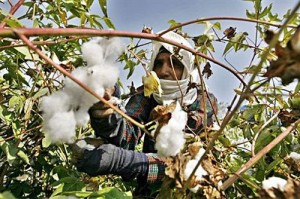
(AFP Photo)
The Ministry of Agriculture and Land Reclamation, represented by the Central Administration for Agricultural Quarantine, has decided to suspend imports of all cotton types from several importation zones worldwide. These include imports to all entities and companies, except the missions charged before 4 July 2015, according to a Tuesday statement from the ministry.
The step was taken targeting the protection of locally produced cotton. The ministry’s statement outlined the availability of a plan to resolve all marketing issues affecting the cotton industry, and to rehabilitate textile factories to absorb local cotton production and transform it into an industry covering the producers’ needs and adding value to the Egyptian product.
Measures and mechanisms are currently being formed by the Agriculture Ministry in cooperation with the specialised entities in Egypt. The import suspension is out of public benefit for producers, manufacturers and importers of cotton, the ministry noted in its statement.
The ministry also stressed its long-term desire to restore Egyptian cotton’s historic place on the market, and to smooth the operation for farmers and to elevate their conditions.
Egyptian long-staple cotton has long remained one of the finest cotton types worldwide. However, modern technology has succeeded in developing short-staple cotton, and elevated its quality to reach the quality of Egyptian cotton, offering it on the market at lower prices. This led to a decline in demand for Egyptian cotton, even within Egypt, due to the availability of imported cotton at a lower price.
In January, Minister of Agriculture Adel El-Beltagy announced that the state will not offer any form of subsidies for cotton farmers or spindles in the next season.
El-Beltagy pointed out that long-staple cotton cultivation is very expensive, and added that there is no demand for it either domestically or internationally.
Furthermore, in late 2014, the Central Agency for Public Mobilization and Statistics (CAPMAS) issued a report showing that the total amount of Egyptian cotton exports decreased by 69.7% in the third quarter of the agricultural season 2013/2014. This is due to the decrease in cultivated areas as a result of farmers opting to grow other, more profitable crops.
However in May 2015, CAPMAS issued a report revealing that the total volume of Egyptian Cotton Exports rose by 94.3% year-on-year during the second quarter (Q2) of the FY 2014/2015 agricultural season.



